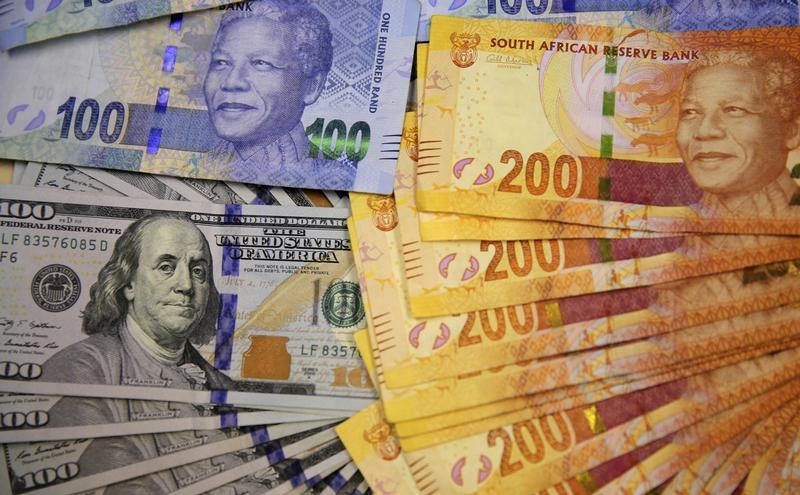
South Africa’s Rand Plummets to 2-Year Low ‘Due to External Factors’
JOHANNESBURG (Reuters) – South Africa’s rand plunged to a 2-year low against the dollar in early trade on Monday and government bonds weakened sharply as a renewed rout in the Turkish lira spread to other emerging market currencies. The rand slid more than 10 percent earlier in the day to hit a session low of […]

JOHANNESBURG (Reuters) – South Africa’s rand plunged to a 2-year low against the dollar in early trade on Monday and government bonds weakened sharply as a renewed rout in the Turkish lira spread to other emerging market currencies.

The rand slid more than 10 percent earlier in the day to hit a session low of more than R15 (15.7000) to the dollar, its weakest since June 2016. At 0740 GMT, the turbulent unit had recouped much of its losses to be 3.27 percent weaker at 14.5400.
The dramatic plummet of the Rand to the US Dollar is due to external factors and has nothing to do with the country’s domestic economic indicators, South African economists stressed.
Momentum indicators tracked by analysts show the move thrust the rand into oversold levels, suggesting a correction is on the cards.
“South Africa’s rand is the most overtraded currency in the world – the equivalent of about 17 percent of its GDP is traded a day – so it’s the best proxy for EM risk and is whacked today because of Turkey,” said Renaissance Capital global chief economist Charles Robertson.
The lira has lost more than 40 percent of its value this year on worries over Turkish President Tayyip Erdogan’s increasing control over the economy and deteriorating relations with the United States.
Turkey’s central bank said it would take all necessary measures to maintain financial stability.
Commerzbank analysts said: “The recovery of the rand following the opening of the markets confirms that at least some market participants have trust in the (South African Reserve Bank) to react appropriately.”
South Africa’s dollar bonds also suffered, with many issues losing around 1.5 cents to hit their lowest levels in around six weeks, according to Tradeweb data.
Meanwhile the average yield premium to hold the country’s debt over safe haven U.S. Treasuries rose to 305 basis points, having added 33 bps in the past week.
On the stock market, the Top-40 index was up 0.48 percent in early trade.
Professor Bonke Dumisa from the University of KwaZulu-Natal said the plummet today “has very little to do with the South African domestic economic indicators.
“Many of us would have loved to see the petrol price go down in September because the rand was showing signs of significantly improving. The petrol price today is at $72, as opposed to $80 in July. But as it is now, if the situation with the Rand does not improve and goes back to what it was over the past two weeks (R13.20), then I’m afraid we might see petrol prices going up again in September.
“But I don’t want to call it just yet because this thing might just fade.”
The manipulators, Dumisa said, wanted to “make a killing as quickly as possible”.
“So it’s all a matter of being opportunistic.”
Despite being optimistic, Dumisa warned that if the situation persisted at these levels, it would spell doom for the country’s inflationary outlook.
“I don’t think it will be a long-term thing, otherwise the consequences will be very dire for the South African economy.”
Raymond Parsons from the North West University School of Business and Governance concurred, pointing out that global markets were currently going through a bad risk-aversion phase, mainly as a result of the economic crisis in Turkey.
“Investors are nervous chiefly because of concerns about Turkey, which are dragging down other emerging market currencies like the Rand,” he said.
As Dumisa pointed out, another factor was that of the rising US interest rates.
Parsons said this makes investment in the US seem more attractive and drains funds from emerging markets.
He said the prospect of trade wars between the US and China is also presently not good news for emerging markets.
“Even if the Rand recovers in the short-term, the international economic environment at the moment still presents a worrying outlook.
“Of course, exporters gain from a cheaper Rand but imports will cost more. The most important domestic risk would be further rises in fuel costs and the petrol price. We have already seen what earlier trends in the global oil price, a weak rand and fuel levies have done to motoring costs.”
To avoid vulnerability to external shocks and Rand volatility, South Africa needs to make its economy less dependent on short–term capital inflows, Parsons said.
“Global capital flows of this kind often reflect sudden shifts in global sentiment and are easily reversed, as we now are again experiencing. Not for nothing are such capital flows often described as ‘hot money’. As a highly liquid currency, the Rand then responds, depending whether such investors want to increase or decrease their exposure to emerging markets like SA. Domestic factors then also come into play in their decision-making,” said Parsons.
The country, he said, needed to do more to attract long-term capital investment in physical or commercial development and business needed to be encouraged to take a long-term view of South Africa’s economic potential.
Sources: Reuters and SANews
(Additional reporting by Karin Strohecker in London and Alexander Winning in Johannesburg; Editing by James Macharia/Reuters and Jenni Baxter/SAPeople)
